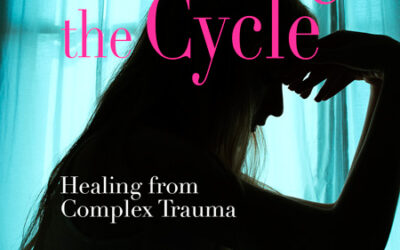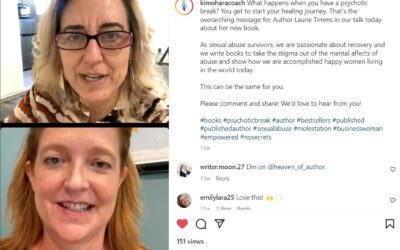When I was three, my mom discovered I could barely see. She took me to get glasses, and I spent 50 years coping with challenged vision.
I realized later in life with the molestation memory, that this blindness contributed to my not being able to see my molester. It never occurred to me until decades later when I got eye surgery. In the process of writing my story for my book, combined with the surgery actually working (I can see!), I had a greater understanding of little Laurie’s blindness.
But being unable to see the truth of my core trauma was important for a long time for my survival. It somehow kept me safe. I muscled through life unwittingly dealing with the aftereffects of trauma. 2007 was a revelation because it was the first time I actually saw all the experiences—including the violent ones—in my life as being connected.
I admit that looking comprehensively at emotions can be scary. Digging up the true feelings can frighten and panic me. Writing a memoir about the traumas, the people who hurt me, losing my mother, and all the other experiences, could cause great emotional distress because I was having a new experience with some of the information. I leaned back into therapy while writing my book. I’m still going!
I also realized that I had always thought of my mental break as dissociation. It was in fact a psychotic break—I even clarified this with my therapist when it came up in the writing. What I experienced was a break with reality, which is called brief reactive psychosis; for me, this was a symptom of my mental illness resulting from surviving multiple traumatic episodes.
What I learned about the break was that I had separated myself from the activities and emotions that were happening around and within me. It was a kind of protection mechanism, as I was finally able to see the molestation. But at the same time, I was hyper-connected to my emotions throughout the break.
I discovered that I had been referring to it as dissociation because I was worried about stigma. Even in my own head, I felt stigma. “Dissociation” sounded so much better to me than “a psychotic break.” But there’s no real benefit to holding onto that stigma and the facade of “dissociation.” I needed to see it clearly and come clean in order to help myself and others.
I have also focused on the core emotions that remain, no matter how much work I do, to curtail the negative effects of the trauma: anger and grief. I’m forever angry at the first person who first abused me, as that is what started the roller coaster. And I feel a deep sadness, the utter blackness of grief, for what I missed out on through the years while dealing with trauma.
One experience survivors have is a state of delayed processing with trauma. One can react calmly at the exact moment it is happening. But later, often weeks or months past, the brain wakes one up to what the experience really was, and there can be an unraveling. Acceptance of all these new truths is the key to a long happy life as a Trauma Fighter.
What do you think? Join the discussion through the comments here.











0 Comments